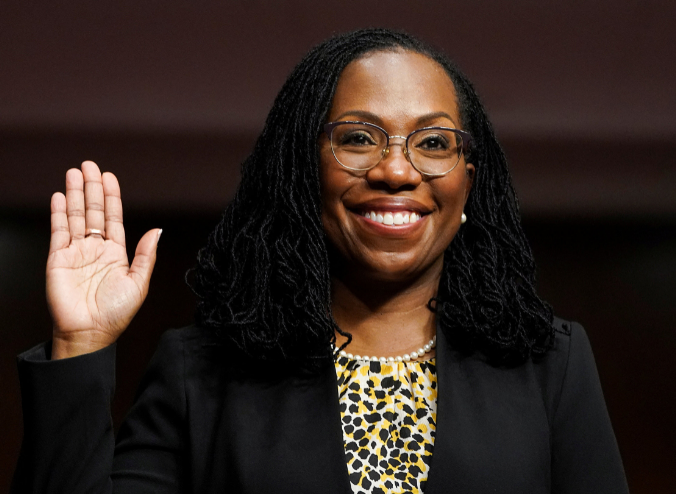
- Details
- By Levi Rickert
President Joe Biden on Friday nominated Ketanji Brown Jackson, 51, a federal appeals court judge for the District of Columbia, to become an associate justice on the U.S. Supreme Court to fill the vacancy created by the upcoming retirement of Associate Justice Stephen Breyer.
Judge Jackson must by confirmed by the U.S. Senate. If confirmed by the Senate, she will become the first African American woman ever to serve on the U.S. Supreme. In nominating Judge Jackson, President Biden fulfills a campaign promise to nominate an African American woman that he made two years ago on this date during a presidential debate in South Carolina.
Want more Native News? Get the free daily newsletter today.
“It’s long overdue that a Black woman serve on the Supreme Court and Judge Ketanji Brown Jackson is an incredibly qualified nominee with strong professional and lived experience, character, integrity, and dedication to upholding the Constitution and rule of law,” President Biden said in statement released by the White House on Friday morning.
"She cares that democracy works for the American people. She listens," President Biden said as he introduced Judge Jackson to the nation from the White House on Friday afternoon.
"Her opinions are always carefully reasoned, tethered to precedent, and demonstrate refrect — respect for how the law impacts everyday people. It doesn’t mean she puts her thumb on the scale of justice one way or the other, but she understands the broader impact of her decisions," President Biden continued. "Whether it’s cases addressing the rights of workers or government service, she cares about making sure that our democracy works for the American people."
"If I am fortunate enough to be confrmed as the next associate justice of the Supreme Court of the United States, I can only hope that my life and career, my love of this country and the Constitution and my commitment to upholding the rule of law and the sacred principles upon this great nation was founded will inspire future generations of Americans," Judge Jackson said in her remarks.
While the Senate is split 50-50 between Democrats and Republicans, Judge Jackson was confirmed by the Senate just last year to sit on the D.C. Circuit Court of Appeals. Three Republicans voted to confirm her. They are Sens. Susan Collins (ME), Lisa Murkowski (AK) and Lindsey Graham (SC).
Judge Jackson served as Justice Breyer’s law clerk and learned up close how important it is for a Supreme Court Justice to build consensus and speak to a mainstream understanding of the Constitution.
Born in Washington, D.C., Judge Jackson grew up in Miami, Fla. Her parents attended segregated primary schools, then attended historically black colleges and universities. Both started their careers as public school teachers and became leaders and administrators in the Miami-Dade Public School System. When Judge Jackson was in preschool, her father attended law school. In a 2017 lecture, Judge Jackson traced her love of the law back to sitting next to her father in their apartment as he tackled his law school homework—reading cases and preparing for Socratic questioning—while she undertook her preschool homework—coloring books.
Judge Jackson stood out as a high achiever throughout her childhood. She was a speech and debate star who was elected “mayor” of Palmetto Junior High and student body president of Miami Palmetto Senior High School. But like many Black women, Judge Jackson still faced naysayers. When Judge Jackson told her high school guidance counselor she wanted to attend Harvard, the guidance counselor warned that Judge Jackson should not set her “sights so high.”
That did not stop Judge Jackson. She graduated magna cum laude from Harvard University, then attended Harvard Law School, where she graduated cum laude and was an editor of the Harvard Law Review.
Judge Jackson lives with her husband, Patrick, and their two daughters, in Washington, D.C.
More Stories Like This
Native News Weekly (August 25, 2024): D.C. BriefsNavajo Nation Mourns the Passing of Former Vice President Rex Lee Jim
Deb Haaland Earns Endorsement From Communications Workers of America Local 7076
University Soccer Standout Leads by Example
Two Native Americans Named to Democratic Congressional Campaign Committee's“Red to Blue” Program
Help us defend tribal sovereignty.
At Native News Online, our mission is rooted in telling the stories that strengthen sovereignty and uplift Indigenous voices — not just at year’s end, but every single day.
Because of your generosity last year, we were able to keep our reporters on the ground in tribal communities, at national gatherings and in the halls of Congress — covering the issues that matter most to Indian Country: sovereignty, culture, education, health and economic opportunity.
That support sustained us through a tough year in 2025. Now, as we look to the year ahead, we need your help right now to ensure warrior journalism remains strong — reporting that defends tribal sovereignty, amplifies Native truth, and holds power accountable.
 The stakes couldn't be higher. Your support keeps Native voices heard, Native stories told and Native sovereignty defended.
The stakes couldn't be higher. Your support keeps Native voices heard, Native stories told and Native sovereignty defended.
Stand with Warrior Journalism today.
Levi Rickert (Potawatomi), Editor & Publisher

